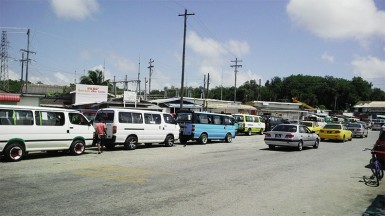Almost four weeks after gas prices were slashed at the pumps and a call for a reduction of fares emanated from the Ministry of Commerce, Route 32 bus operators have joined their colleagues across the country in rejecting that appeal.
When Stabroek News visited the Vreed-en-Hoop, West Coast Demerara (WCD) minibus park on Friday, operators who agreed to speak on the condition of anonymity, unanimously expressed reluctance to lower their fares, citing the high cost of maintenance.
“It took the government seven months to drop the gas prices and they expect us to drop it in less than a month?” asked one driver. He said that as far as he knows, there are no calls for the ferry or speed boat operators to decrease their fares and opined that the ministry was being one-sided.

“The fare not dropping, because there is no guarantee that the gas prices will keep low all the time” said another driver. He further mentioned that in spite of the low gas price, operators are still losing, owing to the high cost of welding, changing tyres, rims and other spare parts. According to him, he currently pays $720 per gallon for gasoline from GuyOil gas station and $785 per gallon of gasoline from Shell gas station on the WCD. Moreover, that driver said, the average cost to change a wheel is $8,000 which could be often due to the deplorable state of sections of the West Coast Demerara public road.
“Let them look into the spare parts,” shouted a bus conductor, adding, “if yuh ain’t got wheels and batteries, how we rolling?” He reasoned that the government should stabilize the price for fuel before calling for a reduction, “…Because one time the gas up and then it down.”
Another issue raised by the drivers is that of the bus operators who do not join the line and wait their turn to receive passengers. Some drivers explained that they start their day as early as 2 am, in order to make enough trips to make a profit. Pointing out that it is humanly impossible for them to do that every day, the drivers said they often settle for two to three trips, barely covering costs. They also explained that the line system would result in them having to let go of their conductors, whom they might not be able to pay.
At that point, this newspaper was shown a log sheet of the time a bus (licence plate provided) joined the line at the bus park. That time was recorded as 7.31 am, but that bus never reached the head of that line until 11.44 am. The drivers said this was a daily occurrence.
In an invited comment, President of the United Minibus Union Eon Andrews said drivers plying the bus route which falls under his union, like the others in the country are being urged to drop their fares against the backdrop of high operating costs and a saturated industry.
Referring to the route 32 bus park at Vreed-en-Hoop and its line system, Andrews said the buses with “decorum” have to wait in a long line for hours before they make a trip, while the “rogue buses which have some kind of protection or connection” and which do not enter the line take advantage by stealing passengers from those obeying the rules of the park.
“The bus don’t run with gas alone,” a Route 45 bus operator had explained to this newspaper, adding, “with maintenance, you spending more than you earn.”
“The drop reasonable but the spare parts going up,” another driver at the bus park added.
Andrews further mentioned that the union is hoping to meet representatives from the Commerce Ministry to continue negotiations on the way forward. The ministry had called on bus operators “to apply conscionable measures by passing on the benefits of the fuel reduction cost to consumers in an effort to ease the cost of living of Guyanese and other residents.” However, operators have rejected the call, citing high cost of maintenance.




